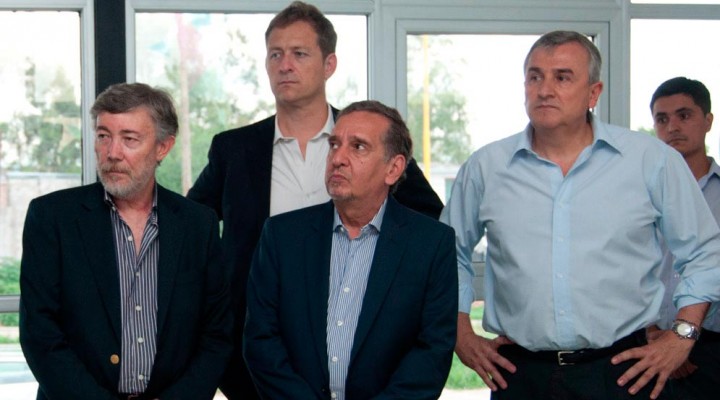Dr. Ceccatto stressed the development of projects for science and technology decentralization in Jujuy
During his visit to Jujuy, the president of the Council together with the officials of the Ministry of Science stressed the creation of institutes devoted to date cultural goods and to Lithium.
The president of the Board of the National Scientific and Technical Research Council (CONICET), Dr. Alejandro Ceccatto, participated in a visit to the province of Jujuy on Monday January 11th together with the minister of Science Technology and Productive Innovation, Dr. Lino Barañao, and other officials at the Ministry of Science. They all met the governor of the province, Gerardo Morales, and stressed the development of different scientific and technological projects: the creation of the Instituto de Datación y Arqueometría (InDyA) – which is going to have the technology to date archaeological samples– and the Instituto del Litio, promoted by the CONICET and the government of the province.
. “We came to accompany the minister to a visit linked to various projects that are in different stages of development and promote decentralization of science and technology”, Ceccatto expressed during the visit to the facilities of the work that will be the head office of the Centro de Desarrollo Tecnológico “General Savio” located in Palpalá, in the premises of the former iron and steel company Altos Hornos Zapla, which will host both institutes.
As regards the projects, he said “ these initiatives link regional problems in which Jujuy has one relative advantage such as the fact of dating cultural goods because a great part of these goods are in the northeast of the region. For this reason, one institute of this type there can become a model at a regional level, with pieces to be dated from all Latin America.”
Furthermore, the president of the Council stressed the relevance of deepening all associations between local universities and the CONICET in order to develop issues of joint interest.
During the visit, minister Barañao and the governor of the province reasserted the team work to boost the scientific and technological development through initiatives such as the industrialization of vicuña fiber and large scale production of gourmet organic food with identity of origin.
It is worth mentioning the enhancement of the Centro de Desarrollo Tecnológico “General Savio” is on its first stage. This involves the construction and refurbishment of the space to place the laboratories, a lithium pilot plant, rooms, a conference room, administration offices and services. Besides, there will be homes for researchers, professionals and advanced learners of different courses of studies that will live there.
The officials who visited the facilities were: the secretary of Articulación Científico Tecnológica of the Ministry of Science, Agustín Campero; Santiago Sacerdote, who represented YPF Tecnología S.A. (Y-TEC); the minister of Education of Jujuy, Isolda Calsina; the minister of Environment, María Inés Zigarán; parliamentary deputy of Mercosur, Norma Aguirre; and national deputies Burgos and Alejandra Martínez, among others. Finally, the major of Palpalá, Pablo Palomares; and the vice-chancellor of the Universidad de Jujuy (UNJu), Rodolfo Tecchi also took part in the meeting.
Finally, the officials visited “El remate”, a farm with great potential for the development of animal biotechnology; and two spaces devoted to research, production and training of digital resources: the Centro de Investigación Local (CILO), and the Centro de Investigación Aplicada de Recursos Digitales (CIARDI), all located in Palpalá.
About Instituto del Litio
The Scientific and Technical Research Centre of Lithium and its Applications will be an institution under the scope of the CONICET, Y-TEC company and the Universidad Nacional de Jujuy (UNJu). Its main objective will be to boost the development of scientific research and technologies applied to explore, exploit and industrialize lithium and its products, identifying the environmental sustainability and the added value such as important characteristics. The construction of this centre and its implementations in the province will lay the foundations for the creation of a scientific research centre.
About Instituto de Datación y Arqueometría (InDyA)
The Instituto de Datación y Arqueometría (InDyA) will be a scientific research centre to solve problems posed by archaeology in different scales, such as the processes of data formation from its origin to its interpretation (context, places and archaeological objects). The project will have tree mainstays: the scientific methods, experimentation and numerical simulation. According to its aims, the institution requires a highly complex technological platform in archaeology devoted to standardize the measurements and enhance the understanding of the remains’ nature and its meaning. This project will have a direct impact on archaeology and on several related fields that collaborate and complement the study, such as biology, geology, chemistry, physics, mathematics, etc.
